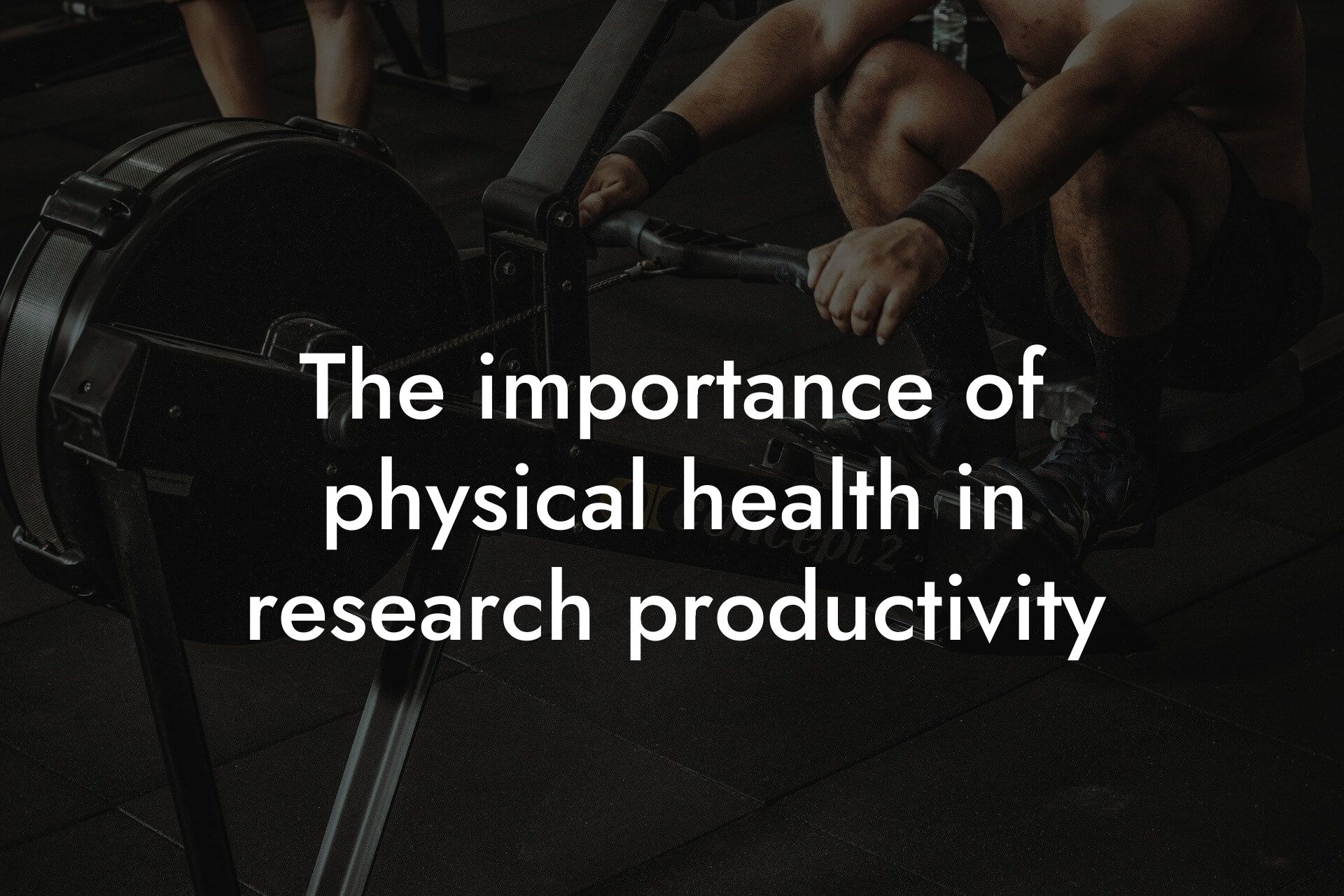As a high-earning professional, you understand the importance of staying focused and mentally sharp during experiments. A well-nourished brain is essential for optimal cognitive function, and a diet that supports brain health can make all the difference in achieving your goals. In this article, we'll explore the nutrition strategies that can help you maintain focus and mental clarity during experiments.
Table of Contents
The Importance of Nutrition for Brain Function
The brain is a highly active organ that requires a constant supply of energy and nutrients to function optimally. A diet that is deficient in essential nutrients can impair cognitive function, leading to decreased focus, memory, and mental clarity. On the other hand, a diet rich in brain-healthy nutrients can improve cognitive function, boost mood, and enhance overall brain health.
Macronutrients for Brain Function
Macronutrients, including carbohydrates, protein, and fat, provide the energy and building blocks necessary for brain function. A balanced diet that includes a mix of complex carbohydrates, lean protein, and healthy fats can help support brain health.
Complex carbohydrates, such as whole grains, fruits, and vegetables, provide a slow and steady release of glucose, which is the brain's primary source of energy. Lean protein, found in foods like poultry, fish, and legumes, is essential for the production of neurotransmitters, such as dopamine and serotonin, which regulate mood and motivation. Healthy fats, including omega-3 fatty acids found in fatty fish and nuts, support the structure and function of brain cells.
Micronutrients for Brain Function
Micronutrients, including vitamins, minerals, and antioxidants, play a critical role in brain function and development. A diet rich in micronutrients can help support cognitive function, improve mood, and reduce the risk of neurodegenerative diseases.
B Vitamins, particularly B6, B9, and B12, are essential for the synthesis of neurotransmitters and the maintenance of healthy nerve cells. Vitamin D, which can be obtained through sun exposure or supplementation, has been shown to improve cognitive function and mood. Antioxidants, such as vitamin C and E, help protect the brain from oxidative stress and inflammation.
Hydration for Brain Function
Adequate hydration is essential for brain function, with even mild dehydration leading to decreased focus, memory, and mental performance. Water makes up approximately 80% of the brain, and a lack of hydration can impair cognitive function, leading to headaches, fatigue, and decreased productivity.
Aiming to drink at least 8-10 glasses of water per day can help support brain health and maintain focus during experiments. Additionally, incorporating hydrating foods, such as watermelon, cucumbers, and celery, into your diet can provide an extra boost of hydration.
Food for Focus
Certain foods have been shown to improve focus, concentration, and mental clarity. Incorporating these foods into your diet can help support brain health and maintain focus during experiments.
Fatty fish, such as salmon and sardines, are rich in omega-3 fatty acids, which support brain function and development. Nuts and seeds, including walnuts, almonds, and chia seeds, are rich in healthy fats and antioxidants, which can help improve cognitive function. Dark chocolate, containing at least 70% cocoa, is rich in flavonoids, which can improve blood flow to the brain and boost cognitive function.
Meal Timing and Snacking
Meal timing and snacking can play a critical role in maintaining focus during experiments. Eating regular, balanced meals can help maintain energy levels and support cognitive function. Incorporating healthy snacks, such as fruits, nuts, and seeds, can provide an extra boost of energy and nutrients.
Aiming to eat a balanced meal or snack every 3-4 hours can help maintain focus and energy levels. Additionally, incorporating a source of protein and healthy fat into each meal can help slow down the release of glucose and provide a sustained energy boost.
Supplements for Brain Function
While a balanced diet is essential for brain health, certain supplements can provide an extra boost of nutrients and support cognitive function. Omega-3 fatty acid supplements, vitamin D supplements, and probiotics can help support brain health and maintain focus during experiments.
Additionally, certain nootropics, such as Bacopa monnieri and Acetyl-L-carnitine, have been shown to improve cognitive function, memory, and mental clarity. However, it's essential to consult with a healthcare professional before adding any supplements to your diet.
Maintaining focus during experiments requires a combination of a balanced diet, adequate hydration, and strategic meal timing and snacking. By incorporating brain-healthy nutrients, including macronutrients, micronutrients, and antioxidants, into your diet, you can support cognitive function and achieve your goals.
Remember, a well-nourished brain is essential for optimal cognitive function, and by following these nutrition strategies, you can maintain focus, improve mental clarity, and take your business to the next level. At Tano Performance Group, we're committed to helping high-earning professionals like you achieve their goals and maintain peak physical and mental performance.
Frequently Asked Questions
What is the importance of nutrition in maintaining focus during experiments?
Nutrition plays a crucial role in maintaining focus and productivity during experiments. A well-nourished brain is better equipped to handle complex tasks, make sound decisions, and stay focused for extended periods. A diet rich in essential nutrients, vitamins, and minerals can improve cognitive function, boost energy levels, and enhance overall mental performance.
How does a healthy diet impact focus and concentration?
A healthy diet provides the brain with the necessary fuel to function optimally. A diet rich in whole foods, fruits, vegetables, whole grains, lean proteins, and healthy fats supports the production of neurotransmitters, such as dopamine and serotonin, which regulate focus, motivation, and mood. A well-nourished brain is better able to filter out distractions, stay focused, and maintain concentration.
What are the key nutrients for maintaining focus and concentration?
The key nutrients for maintaining focus and concentration include omega-3 fatty acids, vitamin D, magnesium, iron, and B vitamins. These nutrients support brain health, cognitive function, and the production of neurotransmitters that regulate focus and motivation.
How can dehydration impact focus and productivity during experiments?
Dehydration can significantly impact focus and productivity during experiments. Even mild dehydration can cause fatigue, headaches, and difficulty concentrating. Dehydration can also impair short-term memory, attention, and decision-making skills, making it essential to stay hydrated throughout the experiment.
What are some healthy snack options to maintain focus during experiments?
Healthy snack options to maintain focus during experiments include nuts and seeds, dried fruits, energy bars, jerky, and trail mix. These snacks provide a boost of energy, support brain health, and can help maintain focus and concentration.
How can caffeine impact focus and productivity during experiments?
Caffeine can have both positive and negative effects on focus and productivity during experiments. In moderation, caffeine can improve alertness, attention, and focus. However, excessive caffeine consumption can lead to jitters, anxiety, and difficulty concentrating.
What is the impact of blood sugar levels on focus and concentration?
Blood sugar levels have a significant impact on focus and concentration. Fluctuations in blood sugar levels can cause energy crashes, mood swings, and difficulty concentrating. Maintaining stable blood sugar levels through a balanced diet and healthy snacking can help support focus and productivity during experiments.
How can meal timing impact focus and productivity during experiments?
Meal timing can impact focus and productivity during experiments. Eating regular, balanced meals can help maintain energy levels, support brain health, and improve focus and concentration. Skipping meals or going too long without eating can lead to energy crashes, fatigue, and decreased productivity.
What are some strategies for maintaining focus during long experiments?
Strategies for maintaining focus during long experiments include taking regular breaks, staying hydrated, eating healthy snacks, getting enough sleep, and engaging in physical activity. These strategies can help improve focus, reduce fatigue, and enhance overall productivity.
How can physical activity impact focus and productivity during experiments?
Physical activity can have a positive impact on focus and productivity during experiments. Regular physical activity improves blood flow to the brain, boosts energy levels, and enhances cognitive function. Even short periods of physical activity, such as stretching or a short walk, can help improve focus and reduce fatigue.
What are some common nutritional deficiencies that can impact focus and concentration?
Common nutritional deficiencies that can impact focus and concentration include iron deficiency, vitamin B12 deficiency, and omega-3 deficiency. These deficiencies can cause fatigue, brain fog, and difficulty concentrating, making it essential to address them through dietary changes or supplementation.
How can stress impact focus and productivity during experiments?
Stress can significantly impact focus and productivity during experiments. Chronic stress can impair cognitive function, reduce focus, and decrease productivity. Engaging in stress-reducing activities, such as meditation or deep breathing, can help mitigate the negative effects of stress and improve focus and productivity.
What are some strategies for managing stress during experiments?
Strategies for managing stress during experiments include time management, prioritization, breaks, and self-care. These strategies can help reduce stress, improve focus, and enhance overall productivity.
How can sleep impact focus and productivity during experiments?
Sleep is essential for focus and productivity during experiments. Lack of sleep can impair cognitive function, reduce focus, and decrease productivity. Aim for 7-9 hours of sleep each night to help support brain health and improve focus and productivity.
What are some tips for staying focused during long hours of experimentation?
Tips for staying focused during long hours of experimentation include setting goals, breaking tasks into smaller chunks, taking regular breaks, and staying organized. These strategies can help improve focus, reduce fatigue, and enhance overall productivity.
How can music impact focus and productivity during experiments?
Music can have a positive impact on focus and productivity during experiments. Listening to calming music or nature sounds can help reduce stress, improve focus, and enhance overall productivity.
What are some common distractions that can impact focus during experiments?
Common distractions that can impact focus during experiments include social media, email, phone notifications, and chatty colleagues. Minimizing these distractions through strategies such as website blockers or noise-cancelling headphones can help improve focus and productivity.
How can breaks impact focus and productivity during experiments?
Breaks can have a positive impact on focus and productivity during experiments. Taking regular breaks can help reduce fatigue, improve focus, and enhance overall productivity. Use breaks to engage in physical activity, practice relaxation techniques, or recharge with healthy snacks.
What are some strategies for staying motivated during long experiments?
Strategies for staying motivated during long experiments include setting goals, tracking progress, rewarding milestones, and staying organized. These strategies can help improve motivation, reduce fatigue, and enhance overall productivity.
How can a healthy gut microbiome impact focus and productivity during experiments?
A healthy gut microbiome is essential for focus and productivity during experiments. A balanced gut microbiome supports brain health, improves cognitive function, and enhances overall productivity. Include fermented foods, probiotics, and prebiotics in your diet to support a healthy gut microbiome.
What are some tips for staying organized during experiments?
Tips for staying organized during experiments include creating a schedule, prioritizing tasks, using a planner or app, and minimizing clutter. These strategies can help improve focus, reduce stress, and enhance overall productivity.
How can a support system impact focus and productivity during experiments?
A support system can have a positive impact on focus and productivity during experiments. Having a support system in place can help reduce stress, improve motivation, and enhance overall productivity. Surround yourself with colleagues, friends, and family who support and encourage you.
What are some strategies for managing fatigue during long experiments?
Strategies for managing fatigue during long experiments include taking regular breaks, staying hydrated, eating healthy snacks, getting enough sleep, and engaging in physical activity. These strategies can help improve focus, reduce fatigue, and enhance overall productivity.
Here are some related articles you might love...
- The importance of physical health in research productivity
- How researchers can maintain fitness during long lab hours
- Managing stress through physical fitness in scientific research
- The impact of body composition on cognitive function in research
- Quick workouts for researchers during lab breaks
- Balancing lab work with personal fitness goals
- The role of physical fitness in preventing research-related injuries
- How to stay active during sedentary research work
- How DEXA scans can benefit scientists and researchers
Zak Faulkner
Zak Faulkner is a leading authority in the realm of physical health and body composition analysis, with over 15 years of experience helping professionals optimise their fitness and well-being. As one the experts behind Tano Performance Group, Zak has dedicated his career to providing in-depth, science-backed insights that empower clients to elevate their physical performance and overall health.
With extensive knowledge of DEXA technology, Zak specializes in delivering comprehensive body assessments that offer precise data on body fat, muscle mass, bone density, and overall physique. His expertise enables individuals to make informed decisions and achieve their fitness goals with accuracy and confidence. Zak’s approach is rooted in a deep understanding of human physiology, combined with a passion for helping clients unlock their full potential through personalised strategies.
Over the years, Zak has earned a reputation for his commitment to excellence, precision, and client-focused service. His guidance is trusted by top professionals who demand the best when it comes to their health. Whether advising on fitness programs, nutritional strategies, or long-term wellness plans, Zak Faulkner’s insights are a valuable resource for anyone serious about taking their health and fitness to the next level.
At Tano Performance Group, Zak continues to lead our Content Team revolutionising how professionals approach their physical health, offering unparalleled expertise that drives real results.




